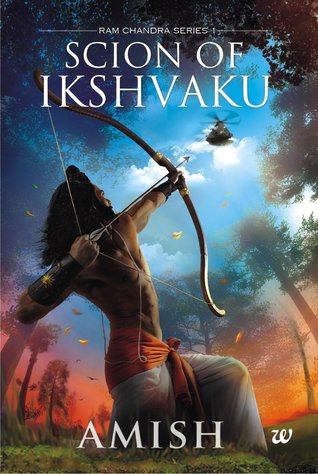A handful of confusions that arouse while reading the Shiva
series of Amish seem to have found solace and hints of answers in
this one. If you have followed his earlier series, you might well have wondered
how the Somras became available to everyone during Ram’s rule or why Ram ruled
in Meluha once he returned from his exile. You might have also wondered about
how Ram’s personality and innate traits would have been, whose karma made him
one of the Vishnus. For readers expecting a new style of writing or a whole
fresh series, you might as well be disappointed. It feels like you are reading
a scion from the earlier series which is just termed differently. Needless to
say that it is an awesome entertainer, this time Amish has kept a better proximity
with the actual story of Ramayana.
 Thoughtful sentences from the book are inspiring and the
dialogues compel us to mull over the sentences and read on a “slow-go” mode. The
sibling talks, the education and the discussions that happen in the Gurukul of
Vashishta have a lot for the readers to learn. Ram is the righteous royal who
considers the nobility also among common men and has a vision of imposing the law
on all, just as equally. Laxman is that loyal guard-brother of Ram who
constantly doubts a conspiracy going on behind his brother’s back. He blindly
abides by what his elder brother say, though he protests at first. Sita is the
tactical and powerful leader here who is portrayed as the Prime Minister of
Mithila, who can also fight strategically and can hunt clean. One can find this
character very similar to Sati of Shiva Trilogy. Within Bharat is a rebel who
refuses to accept the laws as they are, if the logic and law doesn’t coincide.
Shatrughan is the scholar who is the mightiest with books than on battle field.
Urmila is that innocent girl who packs almost a tonne of luggage when they set
for exile and is left behind since she is that delicate girl who couldn’t stand
the forest even for a day.
Thoughtful sentences from the book are inspiring and the
dialogues compel us to mull over the sentences and read on a “slow-go” mode. The
sibling talks, the education and the discussions that happen in the Gurukul of
Vashishta have a lot for the readers to learn. Ram is the righteous royal who
considers the nobility also among common men and has a vision of imposing the law
on all, just as equally. Laxman is that loyal guard-brother of Ram who
constantly doubts a conspiracy going on behind his brother’s back. He blindly
abides by what his elder brother say, though he protests at first. Sita is the
tactical and powerful leader here who is portrayed as the Prime Minister of
Mithila, who can also fight strategically and can hunt clean. One can find this
character very similar to Sati of Shiva Trilogy. Within Bharat is a rebel who
refuses to accept the laws as they are, if the logic and law doesn’t coincide.
Shatrughan is the scholar who is the mightiest with books than on battle field.
Urmila is that innocent girl who packs almost a tonne of luggage when they set
for exile and is left behind since she is that delicate girl who couldn’t stand
the forest even for a day.
Roshini is a doctor who serves the poor. She gets brutally
raped and hurt by immoral gangsters. Roshini’s episode resembling Nirbhaya’s
episode of Delhi seems so apparent in the novel. Dhenuka is a juvenile who is
the chief assailant in the story. That leaves us with an enraged thought of
what could be done with the juvenile who escaped the death sentence because of
law.
It’s not just this part of the story; there are a lot of
situations and conversations which can be linked to present day’s happenings
and today’s society. This a truly thoughtful novel which has told what it wants
to. How we intercept it, is left to the reader though.

